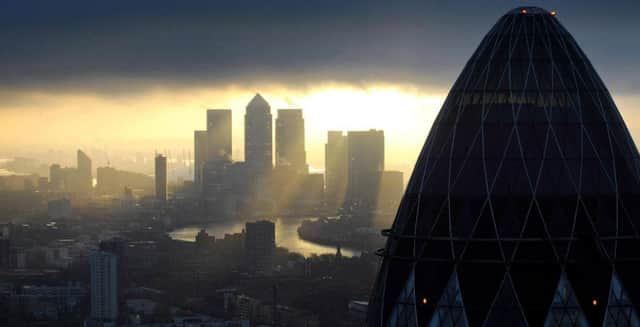Blackfriar: Government must guide us out of economic land of sand and fog


After the publication of the latest index, anybody who voted to stay in the EU could be forgiven for screaming at their Brexit-supporting neighbours: “I told you so!”
Each day seems to bring another raft of depressing economic data.
Advertisement
Hide AdAdvertisement
Hide AdAccording to the former leaders of the Remain campaign, the uncertainty caused by the Brexit vote is making investors and consumers think twice before spending their hard-earned cash.
As a result, the economy is slowing and it will be the poorest who suffer the most.
The latest Markit/CIPS services purchasing managers’ (PMI) index has fuelled fears that we could be heading towards a recession, albeit something milder than the one we experienced after the collapse of Lehman Brothers in 2008.
However, not everyone it seems, will be forced to tighten their belts.
In parts of the City it remains business as usual.
Advertisement
Hide AdAdvertisement
Hide AdDocuments released today revealed that bankers are set to reel in a bumper £206.7m payday as a result of British technology firm ARM’s takeover by Japan’s Softbank.
The likes of Goldman Sachs, UBS and Barclays, along with other financial advisers, aren’t likely to be touched by any slowdown, at least for the time being.
They will share the multi-million pound fees as part of the £24 billion deal announced last month. It’s a sign that we remain a deeply divided nation.
This sounds a terribly gloomy prognosis.
So should we resign ourselves to the prospect of heading to economic hell in a handcart? Certainly not.
Advertisement
Hide AdAdvertisement
Hide AdFirstly, all economic data should be studied with a degree of detachment and healthy scepticism.
As Martin Beck, the senior economic advisor to the EY ITEM club observed, the PMI survey has provided false signals of recession in the past, notably in 1998 and 2001.
The services survey doesn’t cover the all-important retail sector.
Mr Beck added: “There remains a good chance that the more stable political backdrop of the past few weeks will be reflected in firmer sentiment in the forthcoming surveys.”
Advertisement
Hide AdAdvertisement
Hide AdLord Wolfson, the CEO of Next, who backed the Brexit campaign, said there was no clear evidence of a hit to consumer confidence since the vote to leave the EU, although he cautioned that trading conditions will remain tough for the rest of the year.
“The Brexit vote hasn’t really altered consumer confidence one way or the other - the consumer environment was tough before the vote and remains tough,” he added.
If, as seems likely, the Bank of England cuts interest rates it will be terrible news for savers and pensioners. Such a move was unthinkable at the start of the year, when the only way for interest rates seemed to be up.
But, if this is a crisis, it is essentially a political one, with a political solution.
Advertisement
Hide AdAdvertisement
Hide AdWe are currently in the phoney-war after the Brexit vote. The details of our future trading relationships with the EU and the rest of the world have yet to be formed.
Until these agreements are articulated and sold to the business communities at home and abroad there is bound to be a period of doubt which restricts investment and frightens consumers.
Theresa May may well state that Brexit offers the UK the opportunity to “intensify” its relationship with its European allies, but this is all hot air until Article 50 is triggered and negotiations start in earnest.
So she really needs to start the Article 50 process so we all have a much clearer picture of how the economic land lies.
Advertisement
Hide AdAdvertisement
Hide AdUntil these talks begin we can expect to receive more worrying surveys and economic data.
We’ve walked into an economic world of sand and fog. The way out must be provided by Theresa May and her Government as a matter of urgency.